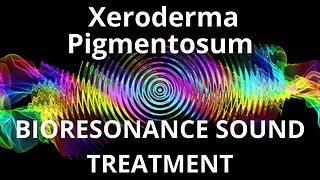Premium Only Content

Macroglossia_Session of resonance therapy_BIORESONANCE SOUND THERAPY
Macroglossia (enlarged tongue) is a rare condition that typically affects more children than adults. People with macroglossia have tongues that are larger than typical, given the size of their mouths. Most people are born with macroglossia that can be linked to conditions such as Beckwith-Wiedemann syndrome or Down syndrome. People can also develop macroglossia from some forms of cancer or severe infections. Macroglossia treatment ranges from speech therapy to surgery.
An oversized tongue that’s always sticking out may be the most obvious and common macroglossia symptom. Other symptoms are:
Noisy, high-pitched breathing (stridor).
Snoring or low-pitched breathing (stertor).
Difficulty eating or drinking (dysphagia).
Drooling.
Difficulty speaking.
Macroglossia has several causes. Very rarely, people are born with oversized tongues but no other medical problems. More frequently, macroglossia is a symptom of an underlying condition that people either inherit or acquire through illness. Some surgeries and medical treatments may cause macroglossia.
What inherited conditions might cause macroglossia?
Macroglossia is linked to several inherited conditions. Here’s information on a few of those conditions:
Beckwith-Wiedemann syndrome: This is a growth disorder syndrome that causes large body size, large organs and can increase children’s risk for developing certain childhood cancers. Approximately 90% of children who have Beckwith-Wiedemann syndrome also have macroglossia.
Hurler/Hunter syndrome (mucopolysaccharidosis): This is a group of diseases that affects your body’s ability to break down sugar molecules.
Down syndrome: People with Down syndrome are born with an extra chromosome, which changes the way their brain and body develop, creating and physical and mental challenges.
What acquired conditions might cause macroglossia?
Acquired causes may include metabolic or endocrine conditions, like hypothyroidism or infections, such as diphtheria. Some acquired conditions that cause macroglossia include:
Amyloidosis: This is a protein disorder that keeps tissues and organs from working as they should. Macroglossia is the most common oral symptom of amyloidosis.
Hypothyroidism: This is a common condition where your thyroid doesn’t create and release enough thyroid hormone into your bloodstream. This makes your metabolism slow down. Hypothyroidism is a common cause of macroglossia in children.
Acromegaly: This is a rare condition that causes your body to release too much growth hormone. People with acromegaly often have oversized tongues, jaws, hands and feet.
Diphtheria: This is an infectious disease that may cause your tongue to swell.
What tumors might cause macroglossia?
Macroglossia can be a symptom of several benign and cancerous tumors, including:
Lymphangioma: This is a benign tumor that develops in your lymphatic system, causing fluid-filled cysts on the mucous membranes in your mouth.
Hemangioma: These are benign tumors that grow from blood vessels.
Lymphoma: This cancer affects your lymph system.
Music affects a person, it can calm and cheer up, sounds can heal. The therapeutic effect is due to the frequency fluctuations of various sounds that resonate with various organs of the body. Sounds have bioresonance compatibility with the vibrations of human internal organs, which is the basis of the positive effect of sound treatment. The sound vibrations of music trigger many mechanisms of higher nervous activity in the patient's subconscious and start the healing process.
Sound therapy does not replace medical treatment, but complements it, improves the positive dynamics of treatment and speeds up recovery.
TO ACHIEVE A POSITIVE RESULT, DAILY LISTENING TO VIDEOS IS REQUIRED.
I wish you health and prosperity!
You can purchase unique medicines in my store:
https://store11998180.company.site/
You have the opportunity to support the channel:
https://destream.net/live/RadSiarAl/donate
-
 32:03
32:03
BIORESONANCE SOUND THERAPY
2 days agoXeroderma Pigmentosum _ Sound therapy session _ Sounds of nature
872 -
 12:29
12:29
Mr. Build It
5 days agoWish I Knew This Before I Started Building It
8.47K9 -
 2:03:57
2:03:57
Megyn Kelly
2 days agoNew Trump Derangement Syndrome, and How CNN Smeared a Navy Veteran, w/ Piers Morgan & Zachary Young
58.3K157 -
 10:05
10:05
DIY Wife
3 years agoHow We Flip Old Furniture For Profit!
27.2K56 -
 2:14:54
2:14:54
TheSaltyCracker
3 hours agoTrump Goes Gangster ReeEEeE Stream 01-26-25
85.1K196 -
 LIVE
LIVE
Due Dissidence
13 hours agoTrump Calls To "CLEAN OUT" Gaza, Swiss ARREST Pro-Palestine Journalist, MAGA's Hollywood Makeover?
2,514 watching -
 2:02:20
2:02:20
Nerdrotic
5 hours ago $1.61 earnedDECLASSIFIED: JFK, MLK UFO Immaculate Constellation Doc | Forbidden Frontier #089
61.1K11 -
 3:00:14
3:00:14
vivafrei
13 hours agoEp. 248: "Bitcoin Jesus" Begs Trump! Rekieta Gets Plea Deal! Pardons, Deportations, Bird Flu & MORE!
125K151 -
 3:44:06
3:44:06
Rising Rhino
12 hours ago $11.89 earnedWashington Commanders Vs Philadelphia Eagles: NFL NFC Championship LIVE Watch Party
56.3K4 -
 13:00
13:00
Exploring With Nug
6 hours ago $1.11 earnedHe Went To Get A Haircut And Vanished WIthout a Trace!
44.1K2